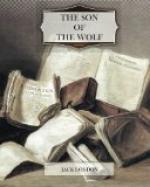Then came a hundred yards’ dash to the lighted parchment window, which told its own story of the home cabin, the roaring Yukon stove, and the steaming pots of tea. But the home cabin had been invaded. Threescore huskies chorused defiance, and as many furry forms precipitated themselves upon the dogs which drew the first sled. The door was flung open, and a man, clad in the scarlet tunic of the Northwest Police, waded knee-deep among the furious brutes, calmly and impartially dispensing soothing justice with the butt end of a dog whip. After that the men shook hands; and in this wise was Malemute Kid welcomed to his own cabin by a stranger.
Stanley Prince, who should have welcomed him, and who was responsible for the Yukon stove and hot tea aforementioned, was busy with his guests. There were a dozen or so of them, as nondescript a crowd as ever served the Queen in the enforcement of her laws or the delivery of her mails. They were of many breeds, but their common life had formed of them a certain type—a lean and wiry type, with trail-hardened muscles, and sun-browned faces, and untroubled souls which gazed frankly forth, clear-eyed and steady.
They drove the dogs of the Queen, wrought fear in the hearts of her enemies, ate of her meager fare, and were happy. They had seen life, and done deeds, and lived romances; but they did not know it.
And they were very much at home. Two of them were sprawled upon Malemute Kid’s bunk, singing chansons which their French forebears sang in the days when first they entered the Northwest land and mated with its Indian women. Bettles’ bunk had suffered a similar invasion, and three or four lusty voyageurs worked their toes among its blankets as they listened to the tale of one who had served on the boat brigade with Wolseley when he fought his way to Khartoum.
And when he tired, a cowboy told of courts and kings and lords and ladies he had seen when Buffalo Bill toured the capitals of Europe. In a corner two half-breeds, ancient comrades in a lost campaign, mended harnesses and talked of the days when the Northwest flamed with insurrection and Louis Riel was king.
Rough jests and rougher jokes went up and down, and great hazards by trail and river were spoken of in the light of commonplaces, only to be recalled by virtue of some grain of humor or ludicrous happening. Prince was led away by these uncrowned heroes who had seen history made, who regarded the great and the romantic as but the ordinary and the incidental in the routine of life. He passed his precious tobacco among them with lavish disregard, and rusty chains of reminiscence were loosened, and forgotten odysseys resurrected for his especial benefit.
When conversation dropped and the travelers filled the last pipes and lashed their tight-rolled sleeping furs. Prince fell back upon his comrade for further information.




